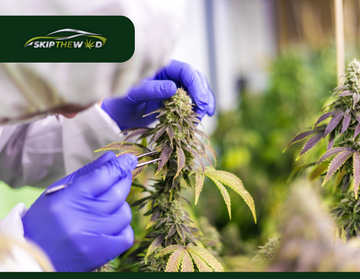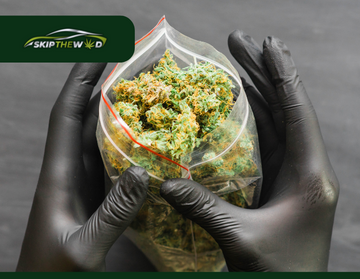In recent years, cannabis has gained increasing attention for its potential therapeutic effects on various mental health conditions. From anxiety and depression to post-traumatic stress disorder (PTSD) and insomnia, many individuals turn to cannabis to alleviate symptoms when conventional treatments fall short. However, the relationship between cannabis and mental health is complex, with both potential benefits and risks.
This article explores how cannabis may impact mental health, highlighting both the positive effects it can offer and the potential risks users should be aware of.
Understanding the Active Compounds in Cannabis
To gain a complete understanding of cannabis's impact on mental health, it's important to explore the active compounds within the plant. The two primary cannabinoids found in cannabis are tetrahydrocannabinol (THC) and cannabidiol (CBD).
- THC: The psychoactive compound responsible for the "high" associated with cannabis use. THC binds to cannabinoid receptors in the brain, influencing mood, cognition, and perception.
- CBD: A non-psychoactive compound that has garnered attention for its potential to reduce anxiety, promote relaxation, and alleviate pain without causing a high.
Both THC and CBD interact with the endocannabinoid system (ECS), a network of receptors that helps regulate various physiological processes, including mood, memory, appetite, and sleep. Understanding this system's role in mental health can help explain how cannabis may affect conditions such as anxiety, depression, and stress disorders.
Potential Benefits of Cannabis for Mental Health
- 1. Anxiety and Stress Relief
One of the most frequently cited reasons for using cannabis is anxiety relief. Low doses of THC and higher concentrations of CBD are particularly effective at alleviating anxiety symptoms. CBD is known for its calming properties, helping users feel more relaxed without the paranoia that can sometimes accompany high doses of THC. Additionally, studies suggest that CBD may have an effect similar to anti-anxiety medications, acting on serotonin receptors to promote a sense of calm and well-being.
THC at lower doses can also reduce stress by activating the brain’s reward and pleasure systems, making users feel euphoric or relaxed. However, the effects of THC are highly dose-dependent, as higher doses may trigger or exacerbate anxiety in some individuals.
- 2. Depression Management
Depression is a complex mental health condition, and research into cannabis's effects on depression is still in its early stages. However, some evidence suggests that cannabis, especially strains high in CBD, may alleviate depression symptoms by boosting serotonin levels. Serotonin is a neurotransmitter responsible for mood regulation, and many antidepressant medications work by increasing serotonin activity in the brain.
Moreover, cannabis may help combat one of the common symptoms of depression—fatigue—by boosting energy levels and motivation in users. However, as with anxiety, the effects of THC and CBD are highly dose-dependent, with high THC consumption potentially worsening depressive symptoms.
- 3. Insomnia and Sleep Disorders
Sleep problems, particularly insomnia, are common among individuals struggling with mental health conditions. Cannabis, particularly strains higher in THC, is well-known for its sedative properties, making it easier for users to fall asleep and stay asleep.
THC can shorten the time it takes to fall asleep, while CBD has been found to reduce REM sleep disturbances, particularly in people with PTSD. This decrease in REM sleep may result in fewer nightmares, which are frequently associated with PTSD and other anxiety disorders.
- 4. PTSD and Trauma Recovery
Many veterans and trauma survivors use cannabis to manage PTSD symptoms. THC and CBD together may help reduce anxiety, alleviate insomnia, and even decrease the frequency and intensity of flashbacks or intrusive memories. Research has found that cannabinoids can disrupt the process of memory reconsolidation, meaning they can weaken the emotional intensity of traumatic memories.
For those suffering from PTSD, cannabis may act as a tool to manage hyperarousal, helping users feel more grounded and less affected by the overwhelming stimuli they encounter.
The Risks of Cannabis for Mental Health
While cannabis offers promising benefits for some mental health conditions, it is not without risks. Cannabis use can affect people differently, and certain factors—such as dosage, the strain used, and the individual's mental health history—play a significant role in how cannabis impacts the user.
- 1. Cannabis-Induced Anxiety
While cannabis can alleviate anxiety at lower doses, higher doses of THC can have the opposite effect, triggering or worsening anxiety and paranoia. Some users experience a racing heart, restlessness, or intrusive thoughts, particularly when consuming high-THC strains. This is why it's crucial to find the right balance when using cannabis for anxiety and to start with low doses of THC or opt for high-CBD strains.
- 2. Risk of Psychosis
Cannabis use, particularly with high-THC strains, has been associated with an increased risk of psychosis. This risk is especially prevalent in individuals with a family history of schizophrenia or psychotic disorders. THC's impact on the brain’s dopamine system may trigger hallucinations, delusions, or disorganized thinking in vulnerable individuals.
Research has shown that frequent and heavy cannabis use in adolescence or early adulthood may increase the risk of developing psychosis or worsening symptoms in those already predisposed. For this reason, anyone with a family history of psychotic disorders should approach cannabis use cautiously, particularly high-THC strains.
- 3. Depression and Motivation Issues
While cannabis can help alleviate depression symptoms in some users, heavy or long-term use, particularly of THC-heavy strains, may contribute to feelings of lethargy or decreased motivation. Some studies suggest that chronic cannabis use may lead to amotivational syndrome, where users experience reduced interest in everyday activities, including work, hobbies, or social interactions. This is particularly problematic for individuals already battling depression, as cannabis use could exacerbate feelings of listlessness or apathy.
- 4. Cannabis Dependence and Withdrawal
Cannabis dependence can develop with frequent use, and withdrawal symptoms, though milder compared to substances like alcohol or opioids, can still be unpleasant. Symptoms of cannabis withdrawal include irritability, mood swings, anxiety, and difficulty sleeping. These symptoms may be especially challenging for individuals already struggling with mental health conditions, making it essential to monitor usage and avoid over-dependence on cannabis as a coping mechanism.
Finding Balance: Tailoring Cannabis Use for Mental Health
When considering cannabis for mental health purposes, it’s crucial to approach it mindfully. Everyone reacts differently to cannabis, and personalizing its use is vital to reaping its benefits while minimizing risks. Here are some tips for safer cannabis use in managing mental health:
- Start with Low Doses: Especially for those prone to anxiety or paranoia, starting with low doses of THC and gradually increasing can help prevent adverse effects.
- Opt for High-CBD Strains: CBD can counteract some of THC’s psychoactive effects and offer mental health benefits without inducing anxiety or paranoia.
- Consult a Healthcare Provider: Individuals with mental health conditions should consult a doctor before using cannabis, particularly those with a history of psychotic disorders or bipolar disorder.
- Monitor Strain Selection: Strain selection is essential. For anxiety relief, choose strains higher in CBD, such as Juice Cake strain or White Pearls strain from Skip the Weed’s collection. If insomnia is an issue, strains like Granddaddy Purple strain or Super Skunk strain may provide the sedative effects needed for restful sleep.
Promising Strains for Mental Health from Skip the Weed
At Skip the Weed, we offer a wide selection of cannabis strains tailored to various mental health needs. Two strains to consider for mental health support include:
- 1. Strawberry Cooler strain: This strain has a balanced THC and CBD profile, making it ideal for reducing anxiety and promoting relaxation without overwhelming psychoactive effects. It’s a great choice for individuals seeking relief from stress while maintaining clarity and focus.
- 2. Sour Diesel strain: Known for its uplifting effects, Sour Diesel is a popular strain for combating fatigue and lethargy associated with depression. Its energizing properties can help boost mood and motivation, making it a perfect daytime option for those needing an emotional lift.
Conclusion
Cannabis has the potential to offer significant relief for individuals struggling with mental health conditions like anxiety, depression, PTSD, and insomnia. However, it’s essential to be mindful of dosage, strain selection, and personal history when incorporating cannabis into a mental health regimen.
For those seeking high-quality, tailored strains to manage mental health, Skip the Weed offers a curated collection of products designed to help you find balance and relief. Whether you need to calm anxiety or improve your mood, strains like Strawberry Cooler strain and Sour Diesel strain provide the therapeutic benefits you’re looking for.









